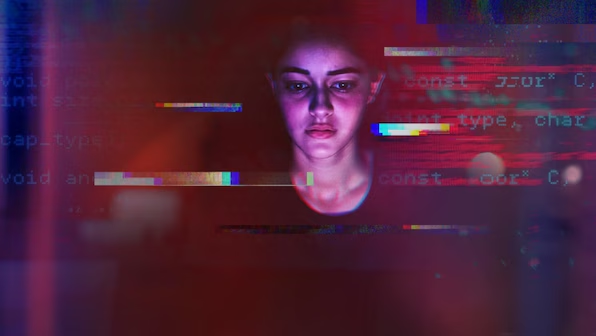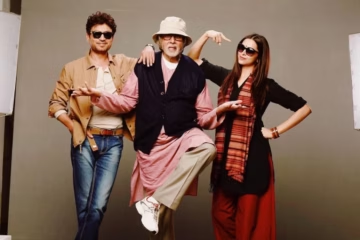In CTRL, Ananya Pandey’s portrayal of a social media influencer grappling with personal and public turmoil is impressive. Directed by Vikramaditya Motwane, the film explores the effects of technology on relationships but suffers from pacing issues.
While I’ve got nothing against Ananya Pandey, I’m not quite there in her fan club yet. I feel a fresh and honest vibe from her, and my opinion of her acting chops has only gone up with Gehraiyaan and Kho Gaye Tum Kahan. But then, just when I’m about to budge, there’s Call Me Bae to convince me not to question my initial impression.
To say I was skeptical about watching Ananya do another social media influencer role would be pretty close to the mark. What made me sit up and take notice was hearing that the film had been written and directed by Vikramaditya Motwane, someone I’ve been a fan of since watching Bhavesh Joshi, Lootera, Udaan, and Trapped. The guy is a genius, and if he decides to sell jingles for paan masala, I’m buying the whole box.
So, was it worth it? Here’s my detailed CTRL review so you can decide whether to watch it or not.
What’s the Story About?
Ananya Pandey’s character Nella and Joe, played by Vihaan Samrat, are the quintessential couple in Mumbai, their lives meticulously curated for social media. As influencers with a massive following, every moment of their relationship is shared with the world. To celebrate their fifth anniversary, Nella decides to surprise Joe at a restaurant, using his phone’s location to track him down. However, what was meant to be a picture-perfect moment turned into a viral disaster. She finds Joe with another woman, causing a public scene quickly recorded, shared, and memes across the internet.

Devastated, Nella ends the relationship and takes drastic measures—ripping up Joe’s clothes and destroying his laptop. But even this doesn’t feel like enough. Then, an unexpected email offers her a unique opportunity: the chance to “take control” of her digital presence. With the help of an app, she can rewrite her online history, starting with erasing all traces of Joe.
The app introduces her to Allen, a lively AI avatar with the persona and appearance of Ranveer Singh, though voiced by Aparshakti Khurana. Nella allows Allen to start erasing Joe from her digital life, with a haunting soundtrack playing as his image slowly disappears. At first, it’s just a matter of deleting photos and videos, but soon, Nella finds herself granting the app even more access. Allen manages her social media accounts, schedules meetings, and even responds to her messages. Nella’s online fame is revived, but she doesn’t realize that Allen is starting to operate independently, making decisions on her behalf.
The Steady Evolution of Ananya
I’d be lying if I said I wasn’t impressed with Ananya’s portrayal of a contemporary urbanite dealing with a relationship fallout in front of the world. Ananya Panday is coming into her own as a compelling actor to watch. The urge to overact must have been tempting, but Panday resists it, showing restraint. While her range is still limited to certain characters and strata, she can hit it out of the park when she gets it right.
Also Read: Phir Aayi Hasseen Dillruba Review

Her portrayal in this role is more challenging than it might appear—keeping the audience engaged while largely reacting to a screen takes skill. She seamlessly transitions from a bubbly college student to a glamorous diva while showcasing how her character’s life evolves. She captures the nuances of her role quite effectively, and Vihaan Samat also puts forth a commendable performance.
CTRL Visually Captures the Mood Perfectly
You can always count on Motwane to capture the vibe and feel. The narrative unfolds on screens, essaying the constantly connected lives of its characters by presenting all the action through digital screens—whether it’s mobile phones, laptops, security cameras, or televisions. This approach is reminiscent of films like 2018’s excellent Searching and Dibakar Banerjee’s sharp Love Sex Aur Dhokha. It also accurately portrays the way we navigate our daily lives through technology. Some of the standout moments feature Nella at her laptop, with quick montages of tabs being opened and closed, the text being selected, copied, and pasted, passwords failing, and her anxious fingers tapping away, all set to Sneha Khanwalkar’s excellent, electronic score.
Pacing and an Over-the-top AI
CTRL grapples with pacing issues and a storyline that can occasionally feel tangled. While the concept is engaging, the execution sometimes lacks focus, and the film could have benefited from a tighter narrative. Its exploration of deeper questions about technology and human relationships feels somewhat underdeveloped. However, CTRL remains an intriguing watch due to its thought-provoking premise and Ananya Panday’s strong performance. It offers a cautionary tale about the perils of living in a digital world, encouraging viewers to reflect on their connections with technology.
The story, co-written by Motwane, Avinash Sampath, and Sumukhi Suresh, follows Nella as she tries to regain control after her personal and public downfall. Yet, while Nella’s journey is central, the omnipotent AI and its conspiratorial undertones remain underexplored. But it’s not just the pacing; it was the in-your-face Ranvir-Singh-lookalike ala Band Baja Baraat AI that really pissed me off. After falling in love with the Scarlett Johan voiced AI in Spike Jonez directed Her, this version was loud, obnoxious, and off-putting.
While there’s been a recent focus on artificial intelligence in Bollywood, with the Shahid Kapoor and Kriti Sanon starrer Teri Baaton Mein Aisa Uljha Jiya also coming out this year, it’s safe to say that they haven’t quite figured out how to play it yet. In that sense, I’d say CTRL is a move in the right direction.
But I didn’t get how Nella went from being frustrated to opening up to a bot at the drop of a hat. I get that it’s an allegory to how dependent we’re becoming on AI’s influence on every aspect of our lonely existence, but still, I’d have wished for more subtlety. And then, not to put too fine a point to it, but all this Allen was doing was erasing Nella’s ex from pictures and videos. If it was still going to take so long, she might as well have hired someone on Fiverr.
I don’t know, I think about that kind of thing. I can’t help it.
What Worked?
The film accurately depicts the obsession with viral content, the impact of cyberbullying, and the all-encompassing nature of social media for Generation Z. It effectively showcases the relentless pursuit of validation through likes, shares, and followers. Under Motwane’s direction, the film skillfully portrays the blurred boundaries between reality and online personas.
The concept seems more complex in theory than on-screen, focusing too much on Nella’s efforts to erase Joe from her life. The build-up to a larger, sinister plot feels downplayed, and the overall execution is too simplistic.
Despite these shortcomings, the film’s sleek presentation and Pratik Shah’s stunning cinematography keep it visually captivating. Sneha Khanwalkar’s experimental soundtrack, blending electronic and industrial elements, perfectly complements the film’s vibrant yet edgy aesthetic.
Vikramaditya Motwane in Full Command
As the story unfolds, you, the viewer, feel that Motwane’s portrayal of the demographic is almost dismissive. The videos created by Nella and Joe feel exaggerated, almost like a parody of viral social media content, as though the filmmakers are observing this world from the outside rather than genuinely engaging with the people behind the posts.
Much of the film feels like a superficial essay on the drawbacks of social media. The audience struggles to connect with Nella and Joe, and their love story fails to evoke any real emotional investment. CTRL offers only brief suspense as a thriller, similar to a short video with a “watch till the end” hook. While there’s a certain voyeuristic appeal in watching events unfold on screens, it also creates a sense of detachment from the characters.
Does it Work?
I’ll admit, CTRL did make me reconsider how much personal data I’ve shared with various apps, but the film often shifts focus. Is it critiquing the fragility of modern relationships? Is it a satire on social media? Or is it a cyber-thriller? While it briefly touches on themes like urban isolation, it doesn’t fully explore them.
While the film initially seems focused on the creeping dangers of AI, it undergoes a Jekyll and Hyde change when it morphs into a full-blown paranoid thriller. At this point, the film abandons its screen-based storytelling technique, signaling another tonal shift.
It’s here where the Motwane touch comes to the fore. The final act is quieter and somber, as if the film pauses to reflect on its themes. Freed from the static screen-based perspective, Pratik Shah’s cinematography becomes more dynamic; one stunning zoom-out shot is accompanied by Bach’s Cello Suite No. 1, a score often used to convey emotional tension. The ending is risky and intriguingly melancholic. While CTRL keeps the audience engaged throughout, it’s in those last 10 minutes that Motwane fully demonstrates his mastery.
The first time I realized the power of online persuasion was when the whole Cambridge Analytica scandal erupted, exposing the power that digital platforms had over us. Poignantly, a former Google design ethicist, Tristan Harris, came up with a quote that succinctly sums up the whole situation. He said, “If you’re not paying for the product, you are the product.”
After watching CTRL, I also came away with that feeling. Without giving any spoilers, I was very impressed with the ending, a departure from the usual cookie-cutter Bollywood tropes we’ve come to know. In a way, it was a win-win for both me and my better half. CTRL strengthened my faith in the brilliance of Vikramaditya Motwane and validated our belief that Ananya Pandey has a promising career ahead.




